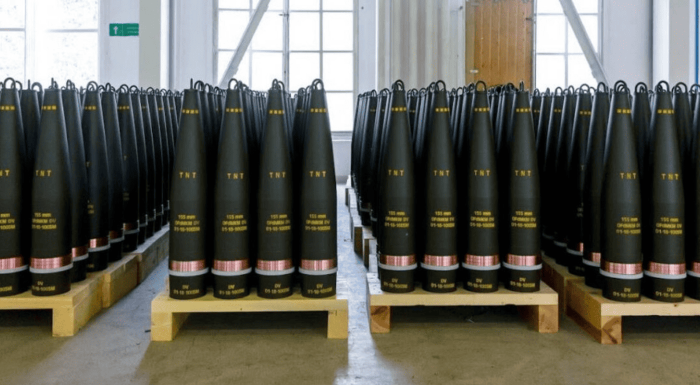The Czech Republic’s artillery shell procurement program for Ukraine has delivered over one million rounds in 2025, but the initiative faces mounting political opposition from the country’s leading opposition party ahead of October’s parliamentary elections.
ANO party leader and former Prime Minister Andrej Babiš has branded the ammunition drive “rotten” and pledged to scrap it if returned to power.
“Based on the information we have, there are inappropriate profit margins, poor quality and questionable suppliers involved. For these reasons, it should be managed at the NATO level,” ANO deputy chair Karel Havlíček told Politico.
Prime Minister Petr Fiala announced the milestone delivery through social media, confirming that “as of today, through the Czech initiative, we have already delivered one million units of large-caliber ammunition to Ukraine this year.” The program, which began in April 2024, aims to deliver 1.8 million rounds throughout 2025, according to Aleš Vytečka, head of the Intergovernmental Defense Cooperation Agency.
The initiative emerged in response to US delays in ammunition shipments to Ukraine at a critical battlefield moment. Czech President Petr Pavel revealed that before the program launched, Russia maintained a tenfold advantage in artillery ammunition, which has since been reduced to a 2-to-1 ratio in Moscow’s favor.
Foreign Minister Jan Lipavský has defended the program against political attacks. “Any halt to the initiative would be a real gift to [Russian President Vladimir] Putin. Those who talk about it are gambling with Europe’s security,” Lipavský warned during a meeting with Czech ambassadors last month.
The ammunition initiative operates by collecting Western donations and purchasing shells on the global market before sending the combined total to Kyiv. Last year, the Czech Republic coordinated delivery of 1.5 million rounds with financial contributions from 14 countries.
Despite the program’s international recognition, domestic support has weakened. A June poll by the Stem organization found that 49% of Czechs believe their country’s support for Ukraine is excessive, while only 29% consider it appropriate and 6% find it insufficient.
ANO’s criticism has resonated with voters, with the party polling at 32 percent support compared to 21 percent for Fiala’s Spolu coalition, according to POLITICO’s poll of polls.
The program has faced transparency concerns, though Vytečka stressed that operational security requires confidentiality. “We cannot publicly disclose the type or price of the ammunition, its destination, or the delivery date. However, every single donation is reported on a weekly basis,” he explained.
Czech President Pavel acknowledged he “can’t guarantee the continuity of Czech policy on Ukraine, as that depends on the outcome of the October election.”
The initiative has elevated the Czech Republic’s international standing. Martin Vokálek from Brussels-based think tank Europeum noted that “across Europe, at least in my circle of colleagues, this is something we are known for.”
Public skepticism reflects broader war fatigue, according to analyst Jiří Táborský. “Since only a few people believe Ukraine will win and even fewer believe there will be a quick resolution, they don’t see the point in sending military aid,” he told reporters.
However, grassroots support remains strong through crowdfunding efforts. The volunteer initiative “Dárek pro Putina” (A Gift for Putin) has raised over 1 billion koruna (€41 million) from more than 360,000 donations to purchase military equipment for Ukraine.
Vytečka attributed Czech generosity to historical memory of Nazi German occupation after the 1938 Munich Conference and Soviet intervention during the 1968 Prague Spring. “Because of the memories of these two events, the majority feels [sympathy] with Ukraine,” he said.




